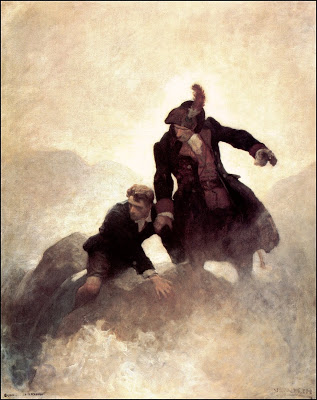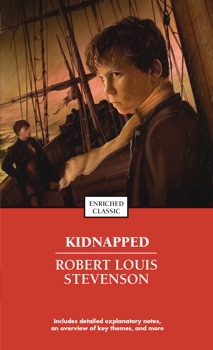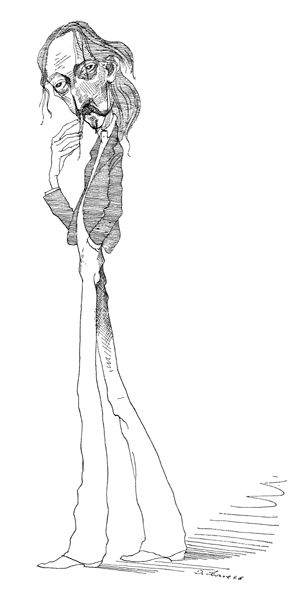The 100 best novels: No 24 – Kidnapped by Robert Louis Stevenson (1886)
A thrilling adventure story, gripping history and fascinating study of the Scottish character, Kidnapped has lost none of its power
Robert McCrum
Mon 3 Mar 2014
In a society shaped by the profound transformations of the 1870 Education Act, Robert Louis Stevenson stands apart from his late-Victorian contemporaries as a strikingly romantic artist, and literary celebrity. He held a very modern attitude to his profession and yet, nevertheless, somehow seemed to sacrifice life to literature. He, of course, disclaimed his commitment, telling an American admirer that he was "a person who prefers life to art, and who knows it is a far finer thing to be in love…" The record of his creativity suggests the opposite, only adding to the aura of enigma that still surrounds him.
So Stevenson remains an elfin, paradoxical figure. In his day, he was read avidly as the author of adventure stories for boys and bestselling horror/fantasy for adults. Treasure Island and The Strange Case of Dr Jekyll and Mr Hyde were instant classics, each a brilliantly concise narrative of quasi-cinematic intensity. Both Jekyll and Hyde and Treasure Island were written incredibly fast, in a matter of days, or weeks. Perhaps this is why (more than many writers in this series), Stevenson was a master at capturing fictional moments with a single vivid image. This was his forte. It was RLS, for instance, who identified the footprint in the sand (in Robinson Crusoe, no. 2 in this series) as a narrative masterstroke.
Anyway, to me, Kidnapped is his masterpiece, an unforgettable novel of action that would inspire writers as varied as Joseph Conrad, John Buchan, Graham Greene and Muriel Spark. It is also a fascinating meditation on the complexity of the Scots character, half Celt, half Saxon. As in Jekyll and Hyde, it shows him obsessed with the divided self, and in the year of the independence vote, Kidnapped remains essential reading. I've chosen it for this series to represent Stevenson's profound Scottishness as well as his genius as a writer.
The novel is deceptively simple. Although it's presented as a boys' story, rooted in historical reality, it also demonstrates Stevenson's artistic sleight-of-hand. Indeed, Kidnapped achieves at least three things simultaneously. First, it's an astounding action adventure in which Stevenson's command of narrative, prose that's pared to the bone, is never less than enthralling. As a reader, he leaves one almost breathless with excitement and admiration. Henry James, no less, was a great fan of the "Flight in the Heather" sequence of chapters. For storytelling verve, turn to chapter 10, "The Siege of the Round House".
Second, Kidnapped takes an historical event, the Appin murder of May 1752, the killing of "the Red Fox", and renders it into a compelling popular tale for the mass audience who first encountered it in the magazine Young Folks. Stevenson did not disdain the genre in which he was operating. Kidnapped, like Treasure Island, comes with a map, to elucidate the drama; his chapter titles alone are designed to sell his tale: "I Run a Great Danger in the House of Shaws"; "The Man with the Belt of Gold"; and "The House of Fear".
Finally, Kidnapped stands out as an inspired and memorable study of the duality in the Scots character. David Balfour, the Whig, is a Lowland Scot of prudent Presbyterian stock whose shocking kidnap occurs as he sets out to claim his inheritance from his evil uncle, Ebenezer. Alan Breck (Stewart), described by Balfour as "a condemned rebel, and a deserter, and a man of the French king's", represents the proud spirit of the Highlands after the Jacobite rebellion of 1745, fiery, reckless, romantic and doomed, with a brilliant line in memorable dialogue. As a pair, they make an unforgettable, often contentious, double act, and both revel (with Stevenson) in the good Scots tongue. Like a rich country fruit cake, Kidnapped is seasoned throughout with handfuls of dialect words, "ain" (one), "bairn" (child), "blae" (cheerless), "chield" (fellow), "drammach" (raw oatmeal), "fash" (bother), "muckle" (big), "siller" (money), "unco" (extremely) , "wheesht!" (shush!), and dozens more.
The Scots dialect words somehow give Kidnapped an inexhaustible fire and brio, but its inner mood is sombre. Stevenson, in Balfour's voice, expresses this as he lives over again "the worst part of my adventures… Ransome carried below, Shaun dying on the round-house floor, or Colin Campbell (the Red Fox) grasping at the bosom of his coat…"
Balfour survives, of course, but for almost everyone else their fate is death. Stevenson himself died suddenly of a stroke on the island of Samoa on 3 December 1894, aged 44.
 |
| An NC Wyeth illustration from the 1913 edition of Kidnapped: 'Never less than enthralling.' |
A note on the text
Kidnapped was written as a "boys' novel" and first published in serial form in the magazine Young Folks from May to July 1886. The novel first appeared in book form from Cassell and Company in July 1886. In the Collected Works of Stevenson, it boasts one of the longest and most elaborate subtitles in English literature: "Being Memoirs of the Adventures of David Balfour in the Year 1751; How he was Cast Away; His Sufferings in a Desert Isle; His Journey in the Wild Highlands; His Acquaintance with Alan Breck Stewart and other Notorious Highland Jacobites; with All that He Suffered at the Hands of his Uncle, Ebenezer Balfour of Shaws, Falsely So-Called. Written by Himself and Now Set Forth by Robert Louis Stevenson with a Preface by Mrs Stevenson".
Kidnapped was well-received on publication and has since attracted the admiration of writers as diverse as Henry James, who praised its narrative brio, Jorge Luis Borges and Seamus Heaney, among many. An inferior sequel, Catriona, was published in 1893.
Other important Stevenson titles:
Treasure Island (1883); The Strange Case of Dr Jekyll and Mr Hyde (1886); A Child's Garden of Verses (1886); The Weir of Hermiston (1896, posthumous).
THE GUARDIAN
THE 100 BEST NOVELS WRITTEN IN ENGLISH
036 The Golden Bowl by Henry James (1904)
040 Zuleika Dobson by Max Beerbohm (1915)
041 The Good Soldier by Ford Madox Ford (1915)
042 The Thirty-Nine Steps by John Buchan (1915)
043 The Rainbow by DH Lawrence (1915)
044 Of Human Bondage by W Somerset Waugham (1915)
045 The Age of Innocence by Edith Warthon (1920)
046 Ulysses by James Joyce (1922)
047 Babbitt by Sinclair Lewis (1922)
048 A Pasage to India by EM Forster (1922)
049 Gentlemen Prefer Blondes by Anita Loss ( 1925)
050 Mrs Dalloway by Virginia Woolf (1925)
051 The Great Gatsby by F Scott Fitzgerald (1925)
070 Nineteen Eighty-Four by George Orwell (1949)
085 The Bell Jar by Sylvia Plath (1966)
THE 100 BEST NOVELS WRITTEN IN ENGLISH
001 The Pilgrim's Progress by John Bunyan (1678)
002 Robinson Crusoe by Danie Defoe (1719)
003 Gulliver's Travels by Jonathan Swift (1726)
004 Clarissa by Samuel Richardson (1748)
005 Tom Jones by Henry Fielding (1749)
007 Emma by Jane Austen (1816)
008 Frankenstein by Mary Shelley (1818)
009 Nightmare Abbey by Thomas Love Peacock(1818)
011 Sybil by Benjamin Disraeli (1845)
012 Jane Eyre by Charlotte Brontë (1847)
013 Wuthering Heights by Emily Brontë (1847)
014 Fair by William Thackeray (1848)
015 David Copperfield by Charles Dickens (1850)
016 The Scarlet Letter by Nathaniel Hawthorne (1850)
017 Moby-Dick by Herman Melville (1851)
019 The Moonstone by Wilkie Collins (1868)
020 Little Women by Louisa May Alcott (1868-9)
021 Middlemarch by George Eliot (1871-2)
023 The Adventures of Huckleberry Finn by Mark Twain (1884/5)
024 Kidnapped by Robert Louis Stevenson (1886)
025 Three Men in a Boat by Jerome K Jerome (1889)
026 The Sign of Four by Arthur Conan Doyle (1890)
027 The Picture of Dorian Gray by Oscar Wilde (1891)
028 New Grub Street by George Gissing (1891)
029 Jude the Obscure by Thomas Hardy (1895)
030 The Red Badge of Courage by Stephen Crane (1895)
031 Dracula by Bram Stoker (1897)
032 Heart of Darkness by Joseph Conrad (1899)
033 Sister Carrie by Theodore Dreiser (1900)
034 Kim by Rudyard Kipling (1901)
035 The Call of the Wild by Jack London (1903)036 The Golden Bowl by Henry James (1904)
037 Hadrian the Seventh by Frederick Rolfe (1904)
038 The Wind in the Willows by Kenneth Grahame (1908)
039 The History of Mr Polly by HG Wells (1910)040 Zuleika Dobson by Max Beerbohm (1915)
041 The Good Soldier by Ford Madox Ford (1915)
042 The Thirty-Nine Steps by John Buchan (1915)
043 The Rainbow by DH Lawrence (1915)
044 Of Human Bondage by W Somerset Waugham (1915)
045 The Age of Innocence by Edith Warthon (1920)
046 Ulysses by James Joyce (1922)
047 Babbitt by Sinclair Lewis (1922)
048 A Pasage to India by EM Forster (1922)
049 Gentlemen Prefer Blondes by Anita Loss ( 1925)
050 Mrs Dalloway by Virginia Woolf (1925)
051 The Great Gatsby by F Scott Fitzgerald (1925)
053 The Sun Also Rises by Ernest Hemingway (1926)
055 As I Lay Dying by William Faulkner (1930)
070 Nineteen Eighty-Four by George Orwell (1949)
071 The End of the Affair by Graham Greene (1951)
072 The Catcher in the Rye by Salinger (1951)
073 The Adventures of Augie March by Saul Bellow (1953)
074 Lord of the Flies by William Golding (1954)
075 Lolita by Vladimir Nabokov (1955)
076 On the Road by Jack Kerouac (1957)
077 Voss by Patrick White (1957)
078 To Kill a Mockingbird by Harper Lee (1960)
080 Catch-22 by Joseph Heller (1961)
081 The Golden Notebook by Doris Lessing (1962)
082 A Clockwork Orange by Anthony Burgess (1962)
083 A Single Man by Christopher Isherwood (1964)
084 In Cold Blood by Truman Capote (1966)085 The Bell Jar by Sylvia Plath (1966)
086 Portnoy's Complaint by Philip Roth (1969)
088 Rabbit Redux by John Updike (1971)
089 Song of Solomon by Toni Morrison (1977)
090 A Bend in the River by VS Naipaul (1979)
091 Midnight’s Children by Salman Rushdie (1981)
095 The Beginning of Spring by Penelope Fitzgerald (1988)
095 The Beginning of Spring by Penelope Fitzgerald (1988)





No comments:
Post a Comment